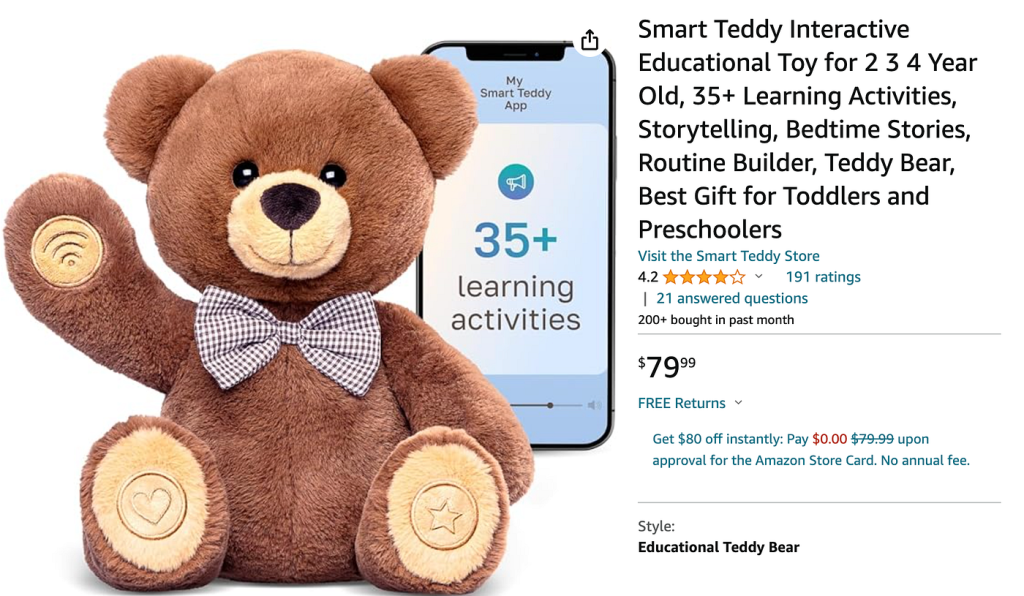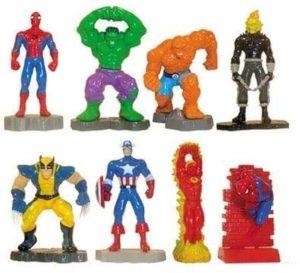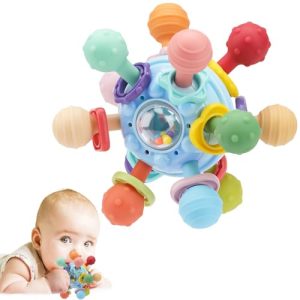Imagine your child’s playtime turning into a powerful learning adventure. With educational app toy integrations, you can make that happen easily.
These smart toys connect with apps to boost creativity, problem-solving, and skills—all while keeping your child engaged and excited. If you want to discover how to combine fun and learning in a way that truly sticks, keep reading. You’ll find out how these innovative tools can transform your child’s development right at home.

Credit: apps.apple.com
Benefits Of App Toy Integrations
App toy integrations combine physical toys with digital apps. This mix creates new ways for children to learn and play. It helps kids stay interested and enjoy learning.
These integrations support different skills and adapt to each child’s pace. They make learning fun and effective by linking screen time with hands-on play.
Enhancing Engagement
App toy integrations keep children focused longer. The interaction between toys and apps makes play more exciting. Kids feel involved and eager to explore new ideas.
- Interactive elements hold attention
- Sounds and visuals create fun learning
- Immediate feedback encourages trying again
- Varied activities prevent boredom
Personalized Learning Paths
Apps connected to toys can adjust to a child’s skill level. They track progress and suggest tasks that fit each learner. This helps children build confidence step by step.
| Feature | Benefit |
| Adaptive difficulty | Matches skill growth |
| Progress tracking | Shows areas to improve |
| Custom challenges | Keeps learning fresh |
Improving Motor Skills
Using app toys helps children practice hand-eye coordination. Moving toys and touching screens develop fine motor skills. These skills are important for writing and daily tasks.
Key motor skills improved by app toy play:
- Grasping and holding objects
- Precise finger movements
- Hand and eye coordination
- Timing and rhythm control

Credit: medium.com
Types Of Educational App Toys
Educational app toys blend learning with technology. They help children gain new skills through fun activities.
These toys use apps to interact with children and support their development in different areas.
Interactive Storybooks
Interactive storybooks combine reading with digital features. Kids listen to stories and see animations on screens.
They often include games and questions to improve reading and listening skills.
- Read-along voice narration
- Animated illustrations
- Touch to hear words or sounds
- Simple quizzes about the story
Stem Learning Kits
STEM learning kits teach science, technology, engineering, and math. These kits use apps to guide experiments.
Children build projects and solve problems with step-by-step instructions on the app.
- Robot-building sets
- Simple coding activities
- Math puzzles and challenges
- Science experiment guides
Language Development Toys
Language development toys use apps to help kids learn new words and practice speaking.
They include games for vocabulary building and tools for pronunciation practice.
- Word matching games
- Speech recognition features
- Interactive flashcards
- Language quizzes and rewards
Technology Behind The Integration
Educational app toys combine physical play with digital learning. They use smart technology to connect toys to apps.
This connection allows interactive experiences that help children learn while they play.
Bluetooth And Wi-fi Connectivity
Bluetooth and Wi-Fi let toys connect wirelessly to apps. Bluetooth works well for short distances.
Wi-Fi supports longer range and faster data transfer. These connections help toys send and receive information quickly.
- Bluetooth pairs devices easily without cables
- Wi-Fi allows multiple devices to connect at once
- Both provide real-time data for interactive play
Augmented Reality Features
Augmented reality (AR) adds digital images to the real world. Educational toys use AR to show 3D objects on screens.
Children can see and interact with virtual items using a tablet or smartphone camera.
- AR makes learning more visual and fun
- It helps explain complex ideas with animations
- Kids can explore virtual worlds linked to the toy
Sensor-based Interactions
Toys use sensors to detect movement, touch, or sound. Sensors send signals to the app to trigger responses.
This interaction makes playtime more engaging and personalized for each child.
- Motion sensors track how a toy moves
- Touch sensors respond when a child presses buttons
- Sound sensors detect voice or noise commands
Credit: codakid.com
Choosing The Right App Toy Combo
Educational app toys help kids learn while having fun. Choosing the right combination is important for effective learning.
Consider factors like age appropriateness, learning objectives, and user-friendly design to make the best choice.
Age Appropriateness
Select app toys that match the child’s age. This ensures the content is suitable and engaging for their development level.
Different age groups have different needs. Choose toys that challenge them without causing frustration.
- For toddlers, choose simple shapes and colors.
- Preschoolers benefit from basic counting and alphabet games.
- Older children can handle puzzles and strategy games.
Learning Objectives
Identify the learning goals you want to achieve with the app toy. This helps in selecting the right educational tool.
Consider if you want to focus on math, language, or social skills. The app toy should align with these goals.
- Math games improve counting and calculation skills.
- Language apps enhance vocabulary and reading.
- Interactive toys develop teamwork and communication.
User-friendly Design
A user-friendly design ensures that kids can use the app toy independently. Simple navigation and clear instructions are key.
Look for features like intuitive interfaces and easy-to-follow steps. These make learning enjoyable and frustration-free.
- Large buttons are ideal for small hands.
- Clear audio instructions guide children.
- Visual cues help in understanding tasks.
Tips For Maximizing Learning
Educational app toy integrations can help children learn while playing. Using these tools smartly can improve their skills and knowledge.
Here are some tips to get the most out of these learning tools and make playtime both fun and educational.
Setting Time Limits
Setting time limits helps children focus without feeling tired. It keeps learning sessions short and effective.
Too much screen time can cause distraction. Time limits encourage balance between learning and other activities.
- Use a timer to track playtime
- Keep sessions under 30 minutes
- Include breaks between sessions
Encouraging Exploration
Allow children to explore app features on their own. Exploration helps them learn at their own pace.
Try not to give all answers. Let kids discover solutions by trying different options in the app.
- Ask open-ended questions
- Let children try new challenges
- Celebrate their discoveries
Parental Involvement
Parents should join their children during app playtime. This support boosts learning and builds trust.
Talk about what your child is doing in the app. Help them understand new ideas and concepts clearly.
- Play together regularly
- Ask questions about the app content
- Encourage sharing what they learned
Future Trends In Educational Toys
Educational toys are changing with new technology. They help children learn better and have fun at the same time.
New trends focus on smarter, more interactive toys. These toys adjust to the needs of each child.
Ai-powered Learning Toys
AI helps toys understand how children play and learn. These toys can give hints or challenges based on the child’s skill.
They use voice and image recognition to interact naturally. AI toys can also track progress and suggest new activities.
Adaptive Learning Systems
Adaptive systems change the difficulty of tasks as children improve. This keeps kids interested and avoids frustration.
Toys with these systems learn from each child’s actions. They create a personalized learning path that fits the child’s pace.
- Adjust questions or games based on answers
- Offer new challenges when ready
- Help build skills step by step
Integration With Smart Home Devices
Educational toys can now connect to smart home devices. This allows for voice control and better interaction with other gadgets.
Smart integration lets toys respond to the environment. For example, toys can adjust sounds or lights based on room settings.
- Control toys with voice assistants
- Sync toys with smart lights and speakers
- Create interactive learning experiences at home
Frequently Asked Questions
What Are Educational App Toy Integrations?
Educational app toy integrations combine digital learning apps with physical toys. They enhance interactive play and improve learning outcomes. This fusion makes education fun and engaging for children.
How Do Educational App Toy Integrations Benefit Kids?
They boost creativity, problem-solving, and motor skills. Kids enjoy hands-on learning paired with interactive technology. This approach increases engagement and retention of educational content.
Which Toys Work Best With Educational App Integrations?
Toys with sensors, AR features, or Bluetooth connectivity are ideal. Examples include building blocks, puzzles, and robotic kits. These toys seamlessly connect with apps to enrich learning experiences.
Are Educational App Toy Integrations Safe For Children?
Yes, reputable brands ensure safety and privacy. They comply with child protection laws and use secure data handling. Parents should check app permissions and toy materials for safety.
Conclusion
Educational app toy integrations help kids learn while they play. They make learning fun and keep children interested. Parents and teachers can use these tools to support skills like reading and math. These apps and toys work well together to boost creativity and problem-solving.
Choosing the right combination helps children stay curious and engaged. In short, these integrations create a rich learning experience for young minds. They bring education and play closer than ever before.





